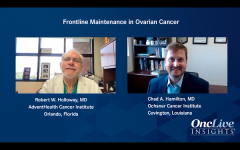
Case Scenario: Stage 3C High-Grade Serous Ovarian Cancer
Experts review the potential maintenance therapy approaches for a 64-year-old woman with stage IIIC high-grade serous ovarian cancer.
Episodes in this series

Chad A. Hamilton, MD: The second case is a 64-year-old who received frontline chemotherapy with the carbo [carboplatin]/Taxol [paclitaxel] for a stage IIIC high-grade serous epithelial ovarian cancer. This is our kind of bread-and-butter patient. Initially, she presented with abdominal bloating and decreased appetite. She had a mass in the right ovary and evidence of peritoneal carcinomatosis. Cytology confirmed that it was high-grade serous ovarian cancer, she was HRD [homologous recombination deficiency]-positive and BRCA2 mutated, CA 125 [cancer antigen 125] was elevated, and there was good performance status. She underwent a primary surgical debulking with gross but minimal residual 1 cm disease. She achieved a partial response to her chemotherapy. Unfortunately, she had pretty severe GI [gastrointestinal] toxicity with diarrhea, often multiple times a day, and a lot of nausea with chemotherapy. How would you approach treatment, and specifically your considerations for maintenance therapy, in this patient?
Robert W. Holloway, MD: This is really kind of an unusual case example, and why I say that is because she has a BRCA mutation in her germline. I would expect that the vast majority of these patients are going to be R0 resected, and his patient actually had 1 cm residual disease. It would make me wonder why and why it wasn’t resected.
Chad A. Hamilton, MD: And only a partial response, too.
Robert W. Holloway, MD: And a partial response. I think this brings up the point that, unfortunately, not every patient with a BRCA mutation gets a CR [complete response], or if they do and they go into maintenance therapy, we still see patients relapse on PARP [poly adenosine diphosphate-ribose polymerase] inhibition. So there’s more to this story. There is more investigation that we need to do to try to find out in real time what’s going on with PARP inhibition or HRD for patients. Not everybody plays by the rules, and this is a patient who’s not playing by the rule. As it stands, she’s having quite a bit of nausea with her chemo, so the next thing makes me wonder that she has some degree of carcinomatosis on small bowel, a functional obstruction, or even mechanical obstruction, from adhesions. She had upfront debulks. I’d want to investigate that as we’re going into maintenance, try to understand why she’s having so many problems with her chemotherapy and her severe nausea. Assuming that we don’t find a surgical issue and it’s just a disease issue or tolerance issue to her therapy, what are her options? Well, clearly, she’s BRCA mutated, so get her onto a PARP inhibitor. She could either go on olaparib [Lynparza] twice a day from SOLO-1, or she could go on niraparib [Zejula] from PRIMA. She could even go on bevacizumab [Avastin] plus olaparib from PAOLA. Again, this GI toxicity issue makes me a little concerned about the bevacizumab. Is this one is going to perforate with disease on our small bowel? She has a partial SBS [short bowel syndrome], so I’d be really wanting to think about that one; I probably go more with a PARP. Looking at the 2, of course, you’d have a discussion about the 2 different PARP options, toxicities, and side effects. I think, obviously, the advantage of the niraparib would be once a day rather than twice a day, so if she’s having nausea with these drugs, that might be a better fit for her. But I think either 1 could be used.
Chad A. Hamilton, MD: I would agree with you on that. For the patients that are having a lot of GI toxicity, I do sort of lean to the niraparib option in those folks. Since it’s once daily, you can treat them at night and add on an antiemetic in the evening, and I think I think they still do pretty well with that. Olaparib would certainly be a reasonable choice in that group and we probably will never have something that will tell us efficacy difference between those 2.
Transcript edited for clarity.







































